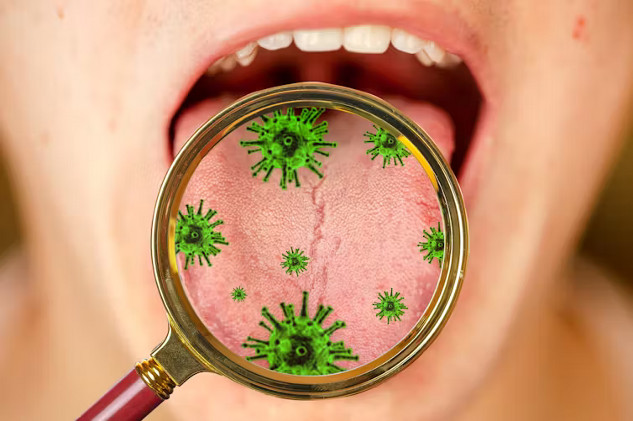
Another good reason to take care of your smile. evgenii mitroshin/ ShutterstockYour mouth is one of the most diverse habitats in the human body. It contains over 700 known species of bacteria, as well as yeasts, viruses and some protozoa. This community is collectively referred to as the oral microbiome – and like your gut microbiome, the bacteria in your mouth play an important role in your health.Some of the most common diseases caused by changes to your oral microbiome are tooth decay and gum disease. But growing evidence suggests that the oral microbiome is also linked to many other serious health conditions that occur elsewhere in the body.
Respiratory diseases
Since the respiratory tract starts in the mouth and ends in the lungs, it’s perhaps not surprising that an overgrowth of the oral microbiome can result in these microbes being inhaled into the lungs.This can commonly lead to infections such as pneumonia, an often fatal disease in the elderly that has been linked to poor oral hygiene, leading to an overgrowth of oral bacteria such as Streptococcus pneumoniae and Haemophilus influenzae.Research has even demonstrated that introducing regular oral hygiene practices and professional dental cleaning in elderly care homes can reduce the number of pneumonia cases by a third. Keeping dentures and mouthguards clean is also important.Poor oral health has also been linked to chronic obstructive pulmonary disease and poorer respiratory function, and this is linked to changes in the oral microbiome.Heart disease
One of the most common oral microbiome diseases is chronic gum disease. This is a destructive inflammatory response that destroys the bone and tissues that support the teeth, eventually resulting in tooth loss. This disease is caused by an overgrowth of the bacteria that thrive in the crevice between your gums and your teeth due to poor oral hygiene.But what has puzzled researchers for years is the strong associations between gum disease and cardiovascular disease.The link may be due to common risk factors. For example gum disease and heart disease are both more common in smokers.Others have theorised that gum disease bacteria might travel to the heart and cause infection. No convincing evidence for this link has yet been presented.Gum disease also triggers a strong inflammatory immune response. Inflammation is how the body tackles infections. It results in the production of immune cells and chemical signals that fight infection. But too much inflammation can be damaging. Some researchers think that inflammation caused by gum disease could damage the cardiovascular system.One study showed that treating gum disease reduced inflammation levels in the bloodstream and significantly improved artery function. Other studies have also shown that treating gum disease reduces overall inflammation levels in the body.These studies demonstrate how a disease in the mouth can have significant effects on the function of tissues elsewhere in the body. And considering many people live with untreated gum disease for decades, the potential for long-term health impacts are significant.Colon Cancer
Oral bacteria have been known to travel through the stomach and into the intestines. Generally, our oral microbes are not well adapted to this new environment and they normally die out. But in 2014, two studies showed that bowel cancers were heavily colonised by a species of bacteria called Fusobacterium which is normally found in dental plaque.Both studies also showed Fusobacterium has a high affinity for malignant cancer cells. This is because the surface of cancer cells allows the bacterium to tightly bind and invade the tumour. Multiple studies have now confirmed that Fusobacterium can colonise tumours throughout the gastrointestinal tract.Research has also shown that colon cancer patients heavily colonised with Fusobacterium respond worse to chemotherapy and have shorter life expectancy compared to those who are not colonised. This may be because tumours infected with Fusobacterium are more aggressive and therefore more likely to spread compared to those that aren’t infected with the bacteria.Investigations are ongoing into this relationship – and whether those at risk of bowel cancer could be vaccinated against this oral bug.Alzheimer’s disease
One of the most controversial links between oral health and disease involves Alzheimer’s disease.Chronic gum disease has been associated with greater cognitive decline in people with Alzheimer’s disease. But since both gum disease and Alzheimer’s disease are associated with ageing, it’s difficult to determine if there’s a clear cause-and-effect relationship.But in 2019, researchers presented evidence that the brains of people with Alzheimer’s disease were colonised with P gingivalis – one of the main bacteria that causes gum disease. The idea that the brain, a normally sterile part of the body, could be infected by oral bacteria is still highly controversial and requires further work.As with heart disease, the inflammation caused by gum disease has also been proposed to be a driver of Alzheimer’s disease in patients with poor oral health.Good oral health
Although the impact of poor oral health seems overwhelming, the good news is that we have the power to manage our oral microbiome and prevent diseases related to it.A good oral hygiene regimen is essential. This includes brushing twice a day and flossing regularly to control plaque and reduce the incidence of cavities and gum disease. If you smoke, quitting can greatly reduce your chances of developing gum disease. It’s also worthwhile visiting your dentist or hygienist every six months for a professional cleaning and personal oral hygiene advice.All this work not only enhances your smile, but may even add years to your life.Related Books:
The Body Keeps the Score: Brain Mind and Body in the Healing of Trauma
by Bessel van der Kolk
This book explores the connections between trauma and physical and mental health, offering insights and strategies for healing and recovery.
Click for more info or to order
Breath: The New Science of a Lost Art
by James Nestor
This book explores the science and practice of breathing, offering insights and techniques for improving physical and mental health.
Click for more info or to order
The Plant Paradox: The Hidden Dangers in "Healthy" Foods That Cause Disease and Weight Gain
by Steven R. Gundry
This book explores the links between diet, health, and disease, offering insights and strategies for improving overall health and wellness.
Click for more info or to order
The Immunity Code: The New Paradigm for Real Health and Radical Anti-Aging
by Joel Greene
This book offers a new perspective on health and immunity, drawing on principles of epigenetics and offering insights and strategies for optimizing health and aging.
Click for more info or to order
The Complete Guide to Fasting: Heal Your Body Through Intermittent, Alternate-Day, and Extended Fasting
by Dr. Jason Fung and Jimmy Moore
This book explores the science and practice of fasting offering insights and strategies for improving overall health and wellness.
























